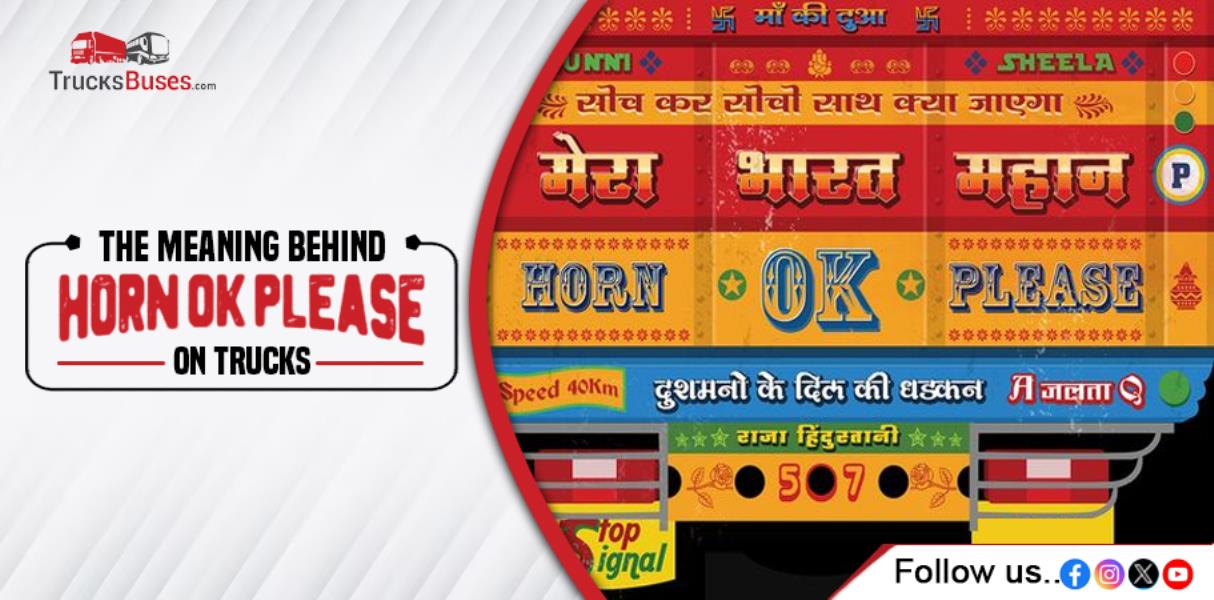"Horn OK Please" is a familiar phrase seen on the back of trucks in India. It signals drivers behind to honk before they attempt to overtake. The phrase originated as a practical solution for narrow roads and has become a significant part of Indian road culture. However, in 2015, the Maharashtra government banned it to help reduce noise pollution and unnecessary honking.
The Context of "Horn OK Please"

Historically, "Horn OK Please" was essential for safety on India's narrower roads. It helped communicate to vehicles behind that it was safe to pass, especially for loading trucks that might have limited visibility. As Indian roads have improved over the years, this phrase has taken on new meanings and significance.
Support for the Ban
Bal Malkit Singh, an All India Motor Transport Congress representative, supported the ban on "Horn OK Please." He stated that while the phrase was necessary in the past, it has become less relevant today due to better road conditions. With wider roads and improved vehicle technology, drivers can now use lights and indicators to signal their intentions more effectively.
Theories Behind "Horn OK Please"
The phrase has led to various theories and interpretations over the years. Here are some of the most common ideas associated with its origin:
1. A Signal for Overtaking
In the past, Indian roads were often narrow, making it risky for vehicles to overtake one another. Trucks, especially loading trucks that had limited rear visibility, needed a way to inform vehicles behind them when it was safe to pass. To address this issue, many trucks were equipped with a bulb above the "OK" sign. When this bulb was lit, it signaled to drivers that it was safe to overtake.
This practical solution eventually evolved into the familiar phrase "Horn OK Please." It not only helped improve road safety but also became a recognizable sight on Indian highways. It showcases how drivers creatively communicate to enhance their safety on the road. But why was it specifically "Horn OK Please" instead of just "Horn Please"?
2. A Reference to Kerosene
Another theory dates back to World War II when there was a global shortage of diesel fuel. During this time, truck drivers of Tata trucks, Mahindra trucks, Eicher trucks or BharatBenz trucks had to look for alternative fuels, such as kerosene. Kerosene is more volatile and flammable than diesel, posing safety risks on the road.
To warn other drivers, truck drivers may have adopted "OK," which stood for "On Kerosene." This would have served as a clear alert to vehicles behind them about the fuel they were using, ensuring safer driving practices.
3. Tata's "OK" Soap Promotion
One interesting theory suggests that the phrase "Horn OK Please" originated from a marketing strategy by Tata, a well-known Indian company. Tata introduced a soap called "OK" and used trucks as a way to promote it.
In the early days, Tata was a major manufacturer of trucks in India. Tata Oil Mills Ltd. (TOMCO) launched a detergent named "OK." To advertise this product, they painted "OK" on the backs of trucks. Over time, the phrase "Horn OK Please" became associated with this branding, as the letters "OK" became a part of truck signage. This theory highlights how marketing can influence everyday language and culture.
The Cultural Significance of "Horn OK Please"
Despite the ban, "Horn OK Please" remains a significant part of Indian driving culture. It evokes memories of when painted signs were essential for driver communication. The phrase symbolizes a unique aspect of Indian road life, where drivers rely on simple messages to ensure safety and cooperation, particularly for loading trucks that often travel on crowded roads.
As roads evolve and new technology emerges, the importance of such phrases may diminish. However, the memories and stories behind "Horn OK Please" resonate with many.
Stay Connected on the Future of Transportation with TrucksBuses.com
Stay informed about the future of transportation by visiting TrucksBuses.com. This website provides valuable information on the latest trends in trucks and buses in India. You can learn about new technologies, safety features, and eco-friendly practices in the transport industry. Whether you are a driver, a business owner, or just interested in vehicles, TrucksBuses.com has something for everyone. Explore articles, updates, and expert insights to help you understand how transportation is evolving.
